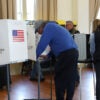The Washington Post reports today on a new study highlighting the effects of the “Great Recession” on marriage. The report from the University of Virginia’s National Marriage Project suggests that while the recent economic downturn has placed financial stress on a majority of married couples, lifelong relationships continue to thrive.
According to the report, more than half of all married Americans experience at least one type of financial stressor, including worrying about paying the bills, struggling to pay the mortgage, or having income reduced through job loss or a reduction in work hours.
Despite these economic hardships, almost one-third of married Americans who experience some kind of financial stress agree that the strain has led to greater personal commitment to their marriage. Likewise, of those couples who had considered divorce prior to the downturn, 38 percent say they have postponed or abandoned those plans as a result of the recession. While the study’s survey did not explicitly ask why married couples are choosing to work harder on maintaining and saving their marriage even in the face of financial hardship, social science demonstrates the many appealing economic benefits of marriage to both individuals and society.
For instance, Heritage analysis of data from the U.S. Census Bureau demonstrates that married families have higher incomes than never-married men and women. Even among married families with only one income, those families’ median income is still greater than that of never-married adults. Likewise, married couples are more likely to own their own home and have greater asset accumulation than households headed by a single.

Not only are the financial benefits of marriage important to individuals and families’ well-being, but the relative economic and social success of marriage also protects against dependence on government. In FY 2010 alone, taxpayers spent roughly $300 billion in welfare funding to support single-parent families.
Marriage also protects against poverty. The risk of a child experiencing poverty (and potentially needing public assistance) in his or her lifetime is six times greater than if the same child was born to married parents. Without the economic stability that marriage provides, single parents often scrape by on salaries that may be fractions of the income earned by their married counterparts. That often leads to dependence on welfare, with taxpayers left to cover the difference.
Even during a recession, Americans are realizing the benefits of marriage and choosing to remain committed to the institution that provides greater economic stability and reduces the risk and burden of poverty for the next generation.
To learn more about National Marriage Week and find a community event near you, visit nationalmarriageweekusa.org.
































6 Replies to “National Marriage Week: It Pays to Get Married, Even in a Recession”